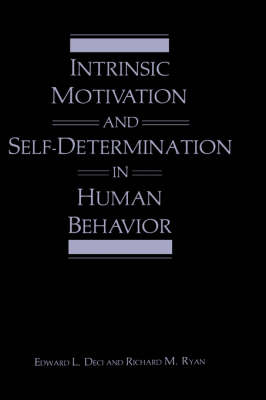Perspectives in Social Psychology
2 total works
As I begin to write this Preface, I feel a rush of excitement. I have now finished the book; my gestalt is coming into completion. Throughout the months that I have been writing this, I have, indeed, been intrinsically motivated. Now that it is finished I feel quite competent and self-determining (see Chapter 2). Whether or not those who read the book will perceive me that way is also a concern of mine (an extrinsic one), but it is a wholly separate issue from the intrinsic rewards I have been experiencing. This book presents a theoretical perspective. It reviews an enormous amount of research which establishes unequivocally that intrinsic motivation exists. Also considered herein are various approaches to the conceptualizing of intrinsic motivation. The book concentrates on the approach which has developed out of the work of Robert White (1959), namely, that intrinsically motivated behaviors are ones which a person engages in so that he may feel competent and self-determining in relation to his environment. The book then considers the development of intrinsic motiva tion, how behaviors are motivated intrinsically, how they relate to and how intrinsic motivation is extrinsically motivated behaviors, affected by extrinsic rewards and controls. It also considers how changes in intrinsic motivation relate to changes in attitudes, how people attribute motivation to each other, how the attribution process is motivated, and how the process of perceiving motivation (and other internal states) in oneself relates to perceiving them in others.
Intrinsic Motivation and Self-Determination in Human Behavior
by Edward L. Deci and Richard M Ryan
Published 31 August 1985
Early in this century, most empirically oriented psychologists believed that all motivation was based in the physiology of a set of non-nervous system tissue needs. The theories of that era reflected this belief and used it in an attempt to explain an increasing number of phenomena. It was not until the 1950s that it became irrefutably clear that much of human motivation is based not in these drives, but rather in a set of innate psychological needs. Their physiological basis is less understood; and as concepts, these needs lend themselves more easily to psycho logical than to physiological theorizing. The convergence of evidence from a variety of scholarly efforts suggests that there are three such needs: self-determination, competence, and interpersonal relatedness. This book is primarily about self-determination and competence (with particular emphasis on the former), and about the processes and structures that relate to these needs. The need for interpersonal relat edness, while no less important, remains to be explored, and the findings from those explorations will need to be integrated with the present theory to develop a broad, organismic theory of human motivation. Thus far, we have articulated self-determination theory, which is offered as a working theory-a theory in the making. To stimulate the research that will allow it to evolve further, we have stated self-determination theory in the form of minitheories that relate to more circumscribed domains, and we have developed paradigms for testing predictions from the various minitheories.

